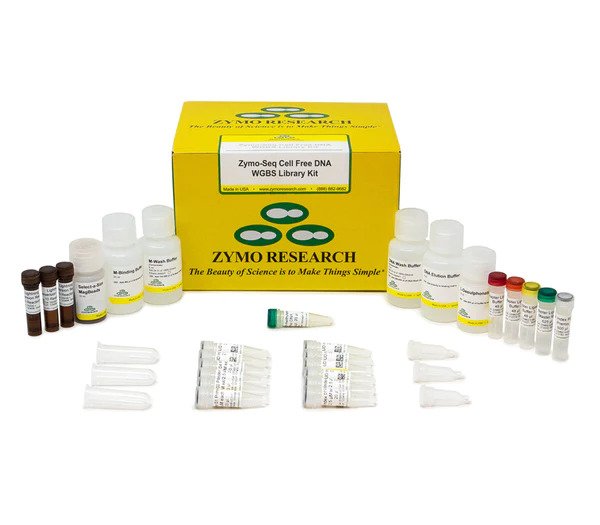
- Optimized for small fragment input: Ideal for small and damaged DNA fragments such as cell-free DNA (cfDNA).
- Accurate methylation calling: Direct ligation-based protocol allows for accurate reads and methylation calling of native termini for each DNA fragment.
- Streamlined and simple workflow: Prepare robust methyl-seq libraries in as little as 3 steps.
Zymo-Seq Cell Free DNA WGBS Library Kit provides an optimized and reliable workflow for whole genome bisulfite sequencing (WGBS) library preparation from cell-free DNA (cfDNA). This all-inclusive kit features a straightforward procedure capable of preparing high-quality methyl-seq libraries from as little as 5 ng of cfDNA. The process is completed in three basic steps: bisulfite conversion, direct adapter ligation, and index PCR amplification.
The initial bisulfite treatment is gentle on cfDNA yet effective in converting any unmodified cytosines into uracil. Next, the innovative splinted adapters capture and directly ligate the Illumina-compatible adapters onto any size DNA fragment, allowing for sequencing of nicked, damaged, and short DNA fragments that may have otherwise been discarded with traditional library prep methods. The direct ligation of the adapters also eliminates the need for second strand synthesis, end repair, and dA tailing steps, thus reducing bias by preserving the integrity of any native methylation that is present on the fragment termini. Finally, the adapter-ligated cfDNA is indexed and amplified via PCR with Zymo-Seq UDIs, generating libraries that are ready for sequencing on any Illumina instrument.
| Barcode Sequences | Please refer to the Documents Section. |
|---|---|
| Bisulfite Conversion | >99.5% of non-methylated cytosine residues are converted to uracil; >99.5% protection of methylated cytosines. |
| Equipment Required | Thermal cycler(s) with temperature adjustable lids, microcentrifuge, magnetic stand. |
| Hands-On Time | ~2 hours |
| Input Quality | For optimal results, use at least minimum input of purified cfDNA with no RNA or gDNA contamination. cfDNA can be concentrated using the DNA Clean & Concentrator (D4013) prior to processing. Input cfDNA can be suspended in water, DNA Elution Buffer, or TE buffer. |
| Library Storage | Libraries eluted in DNA Elution Buffer (provided) may be stored at ≤ 4°C overnight or ≤ -20°C for long-term storage. |
| Maximum Input | 10 ng |
| Minimum Input | 5 ng |
| Sample Input Material | Purified cell-free DNA (cfDNA) |
| Sequencing Compatibility | Libraries are compatible with all Illumina sequencing platforms. Recommended: NextSeq, NovaSeq. |
| Total Processing Time | ~6 hours |
FAQs
It is possible to generate libraries with inputs lower than 5 ng; however, the quality of such libraries is not guaranteed. Typically, at lower inputs the percentage of adapter dimers increases in the final library. For best results, we recommend concentrating the sample input as much as possible to meet the 5 ng minimum input prior to using the kit. Samples can also be concentrated using a DNA Clean & Concentrator Kit and/or during the bisulfite conversion step by reusing the same column for clean-up.
It is possible to generate libraries with inputs higher than 10 ng; however, the quality of such libraries is not guaranteed. For best results, we recommend diluting your sample down to meet the 10 ng maximum input.
We recommend up to 4 freeze-thaw cycles for the Adapter Ligation Buffer 2 (orange cap), Adapter Ligation Buffer 3 (yellow cap), and the Adapter Ligation Master Mix (green cap). After 4 freeze-thaw cycles, the quality of the libraries may vary. We recommend making additional aliquots of these buffers upon first use as necessary to minimize the potential freeze-thaw cycles the reagents undergo. The Adapter Ligation Buffer 1 (red cap) is not as sensitive to freeze-thaw cycles and therefore is not affected by being thawed more than 4 times.
Each tube/well contains a pre-mixed forward and reverse primer set that contain a unique i5 and i7 index, respectively. The concentration of each UDI primer pre-mix is 5 µM total (2.5 µM each primer).
Libraries are suitable for any cycling number, but increased cycling numbers will require greater amounts of adapter trimming for the shorter library fragments. For most applications, 100 base paired-end (PE) reads are enough to generate substantial amounts of high-quality data for genome-wide coverage. The sequencing depth will be dependent on the genome size, genome coverage, and site coverage required. Generally, aiming for 10X coverage per CpG site is recommended.
Using 100 bp PE sequencing, we recommend at least 500 million reads for human cfDNA WGBS at 10X CpG coverage, and at least 400 million reads for mouse cfDNA WGBS at 10X CpG coverage.
Yes, however the protocol is optimized for cfDNA and adjustments will need to be made.
Kit Components
| Cat # | Name | Size |
|---|---|---|
| D5030-1 | Lightning Conversion Reagent | 1.5 ml |
| D5032-1 | Lightning Conversion Reagent | 15 ml |
| D5001-3 | M-Binding Buffer | 20 ml |
| D5002-3 | M-Binding Buffer | 80 ml |
| D5001-4 | M-Wash Buffer | 6 ml |
| D5002-4 | M-Wash Buffer | 24 ml |
| D5030-5 | L-Desulphonation Buffer | 10 ml |
| D5031-5 | L-Desulphonation Buffer | 40 ml |
| D3004-4-4 | DNA Elution Buffer | 4 ml |
| D3004-4-16 | DNA Elution Buffer | 16 ml |
| C1004-50 | Zymo-Spin IC Columns | 50 Pack |
| C1001-50 | Collection Tubes | 50 Pack |
| D4003-2-6 | DNA Wash Buffer (Concentrate) | 6 ml |
| D5016 | E. coli Non-Methylated Genomic DNA | 5 µg/20 µl |
| D3008 | Zymo-Seq UDI Primer Set (Indexes 1-12) | 12 indexes |
| D3096 | Zymo-Seq UDI Primer Plate (Indexes 1-96) | 96 Indexes |
Zymo-Seq Cell Free DNA WGBS Library Kit
| Cat # | Name | Size |
|---|---|---|
| D5462 | Zymo-Seq Cell Free DNA WGBS Library Kit | 24 Preps |
| D5463 | Zymo-Seq Cell Free DNA WGBS Library Kit | 96 Preps |

